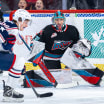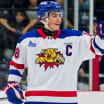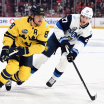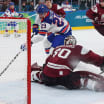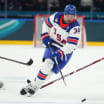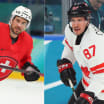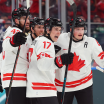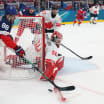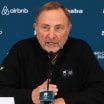Solomon discusses transition to GM, Ducks success in Q&A
Executive who took over for Murray in November impressed with play of Getzlaf, Terry, Zegras
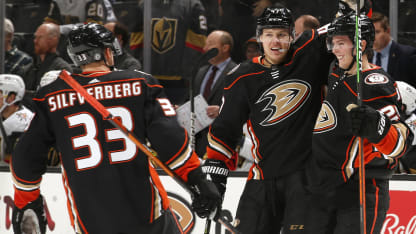
© Debora Robinson/Getty Images
But now that he has the job, he's determined to do his best to guide the Ducks' continued emergence as a Stanley Cup Playoff contender and, in the process, demonstrate he's worthy of keeping it.
"Nobody's job is permanent and safe without getting results, and I don't think this would be any different," Solomon said Monday when the Ducks visited the Washington Capitals. "So I think it's an opportunity to prove myself and, until I'm told otherwise, that's exactly what I'm intending to do."
Anaheim (13-8-5) has been one of the revelations in the NHL this season, hovering at the top half of the Pacific Division standings and getting surprising performances from several players, including forward Troy Terry, who had a 16-game point streak this season and has scored 26 points (15 goals, 11 assists) in 25 games.
Anaheim is 11-4-2, including a four-game point streak (2-0-2), heading into its game at the Buffalo Sabres on Tuesday (7:30 p.m. ET; ESPN+, HULU, NHL LIVE).
Ducks owners Henry and Susan Samueli asked Solomon to take over as GM after Bob Murray resigned Nov. 10 following an investigation into his professional conduct.
Solomon found himself running a team he'd joined less than six months earlier as vice president of hockey operations and assistant GM.
The 63-year-old had never been a GM but has extensive experience in the game. He was a hockey operations executive with the Los Angeles Kings for 15 years. Before that, he was a player agent for 20 years.
In a way, becoming a GM was the natural progression for Solomon. How it happened wasn't.
"In the back of my mind, I had hoped to climb the ladder," he said. "I was assistant GM, so there was only one additional step up. One thing I never could have foreseen was the opportunity coming this quickly. So an unfortunate set of circumstances and not part of the playbook, but in the end, it's an opportunity I couldn't pass up."
After the Ducks went 17-30-9 last season and missed the playoffs for the third consecutive season, few outside the organization expected them to have a chance to qualify this season. But Solomon said that making the postseason is one thing that was always part of the plan for this season.
"That's been the philosophy from Day One. That's been the approach," Solomon said. "Nothing's changed. I think if anything it's really fortified our opinion and solidified our thoughts that we had coming into the season that this was possible."
Solomon discussed Anaheim's play and his transition to the GM job in a Q&A with NHL.com:
What have you thought of how the Ducks have played over roughly the first quarter of the season?
"I think we've probably exceeded most outsiders' expectations. One thing maybe that people lost sight of was the injuries that the team had last year to key personnel. To this point, they've been relatively healthy, the guys that have come back. (Forward) Rickard Rakell missed a little bit of time, but we were going pretty well, and guys were able to step up and take his place. But I think overall we've got a great coaching staff. The entire assistant coaching staff (Geoff Ward, Newell Brown and Mike Stothers) is new here, but they really mesh well together. They believe in each other, and I think that enthusiasm has spread through the locker room."
Captain Ryan Getzlaf is 36 years old, but the center was one of your best players with 20 points (one goal, 19 assists) in 23 games before sustaining a lower-body injury that's kept him out since Nov. 30. How was he doing it?
"I think Ryan Getzlaf somehow on his drive home -- I live really close to him -- found the fountain of youth and I'm going to follow him home until I actually find it. … He's amazing. He's a great leader for the team, and just the way approaches everything it's actually fun to see how excited he is. He's been leading that line. He's had great linemates. Troy Terry is doing really outstanding. He's had a couple guys on the left side, but Adam Henrique has been playing really well. So that line together, they've all been really good.
"But a lot of so-called older players, the veteran players, have not just continued the leadership role but they've actually performed really well. And we've got young guys that have stepped in. (Forward) Trevor Zegras is a young rising star. (Defenseman) Jamie Drysdale is a young rising star. And they're not the only two. So we've got some good young players that are making really important contributions right now."
Is that what you expected or have the young players put the rebuild ahead of schedule?
"Well, I think you kind of plan for them to make an immediate positive impact. You don't necessarily count on it, but you know that if they take that step that it will be an important step for the organization. I think it's a number of factors. I think it's the play of the veteran players. I think it's the impact that the young players have made. We've gotten outstanding goaltending. We've got solid players like Hampus Lindholm, an outstanding defenseman who missed time last year, who has been healthy all year. All of that taken together, I think, maybe caught people by surprise a little bit."
Some veterans in Getzlaf's position after 16 seasons with one team might have looked to go to a contender when he had a chance to become an unrestricted free agent this past offseason. How much has Getzlaf buying into the plan and coming back on a one-year contract helped the process this season?
"When you have a guy who has played 1,000 games, he's the leading scorer in franchise history, when he sees what we're doing and he decides that he wants to stay when he's being pursued by other teams and had all kinds of opportunities, I think that's a positive sign for us as an organization, but also in what he thinks this team is capable of doing. And he's made a tremendous impact on that."
It's almost a month since you became GM. What has it been like so far?
"Busy. Right now, I'm doing two jobs. I'm doing my old job and then I'm picking up where Bob left off. So I've been trying to play catch-up for a few weeks and I feel like I'm now finally standing on solid ground. I have a good pace under me, and I think we're in a good place. It helps that the team has been playing relatively well also."
When you were hired, you were given the "interim" title, but are you operating as if you will be the GM for at least the rest of the season?
"That's the way I'm approaching it and that's the way I've been told to approach it. I don't have any restrictions on me. I have the same latitude that every general manager in the League has. I report to people and have ownership that I report to, but as far as decisions and recommendations, it's really the same, probably the same set of obligations, duties, responsibilities as any other general manager."
In your previous jobs, you weren't the person other GMs called to talk about potential trades. What has that been like?
"You know what? It's kind of a return to my last role before I was with a team. In my communications with all the GMs, they've all been great. They've all been really supportive. Everybody's talked about all the experience I have, which is 35 years, and 20 of that was actually dealing with all these guys on the other side of the table (as an agent). I always had the relationships with them, and it's just kind of picking up those relationships where they left off. So it's been really seamless."
You weren't with the Ducks long before you became GM. Have you had to learn on the fly about the organization when it comes to the players, prospects, scouts and other staff members, or had you done that before Murray resigned?
"I'm fortunate that I had sort of a six-month introduction to the organization because a lot of the people, although I knew them in passing, I wasn't intimately familiar with the work that they did. I think a lot the results speak for itself. The scouting staff is outstanding. But I got to work with the entire staff and very closely with (assistant general manager) Martin Madden during the (2021 NHL) Draft, and that was extremely helpful.
"When I came in sort of late spring or early summer was before all the decisions had to be made as far as player signings and I did almost all of our contracts except for a few minor league ones. So I really had a little bit of runway to become familiar with the organization and the players. And the players I saw pretty close up too. So I had a pretty good feel for most of the guys."
